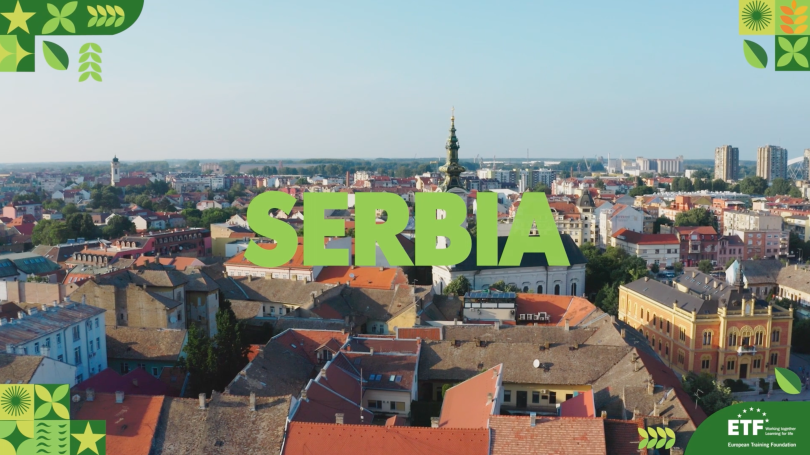
Green Skills Award 2023 finalist: Serbia - The Green Art Incubator
Green Art Incubator: Transforming culture for a sustainable future
In Serbia, climate change is barely on the public radar with little sign of a broad reaction from citizens and institutions to an issue that is at the top of the political agenda in Western Europe.
Green Art Incubator, a Belgrade-based NGO, is doing something about this. Targeting arts and culture organisations and creators, Green Art Incubator aims to support eco-friendly and sustainable practices within the arts, and encourage their use to raise awareness of the threat posed by climate change. By greening the arts in Serbia, the project – headed by experts and professionals in interdisciplinary fields – hopes to set an example for the rest of the Western Balkan region.
The project's innovative nature makes it one of the 10 finalists in the European Training Foundation’s Green Skills Award 2023.
Green Art Incubator has two main goals, says Jovana Kraulić, one of the co-founders of the project, who works at the Faculty of Dramatic Arts in Belgrade. The project is designed to encourage a shift to more ecologically sustainable management philosophies and work procedures in culture and the arts, and to reflect and redefine the social role of culture as an agent of change in this context.
Through education and capacity building for theatre producers, event managers, theatre technical personnel (lights, sounds etc.), film producers, directors, marketing managers, visual artists, curators, museum employees, and others across the creative industries, the project aims to support the green transition in the arts. There are six key elements to this aspect of the Green Art Incubator:
-
research and mapping of cultural and arts stakeholders to identify weaknesses and strengths in green and sustainable practices;
-
establishing a digital platform as a resource to support those making the green transition;
-
training and courses for arts groups led by local and international experts;
-
development of unique green e-toolkits for art and culture, focusing on creative and innovative methods to contribute to climate change adaption – for example introducing a green workplace philosophy, greening promotion, press and advertising, and reducing waste and energy use;
-
preparing a Green Book of Recommendations for public policy planners and decision-makers;
-
networking actors in the field of arts and culture through an informal network interested in green transformation processes.
Using art and culture to directly address the demands of the green transition is also essential, Jovana says.
“The arts and culture can be very effective in raising awareness among the audience and public on the ecological crisis, and encourage their more active involvement in addressing these issues.”
Projects taken on by the Green Art Incubator platform include an international conference, Challenges of green art practices, which brought together leading experts and practitioners in the field of sustainable artistic practices in order to exchange resources and affirm the importance of green concepts among creative sectors.
The platform has also initiated a video interview series named Climate Late Night, intended to raise awareness among the professional community and general public on environmental issues through gathering leading eco-activists and artists dealing with these topics. The first participant in this series was Josh Fox, the award-winning director most widely recognised for his movie GasLand, while the further development of the series is planned for the second half of this year.
Results so far are encouraging, Jovana says. More than 80 cultural professionals from over 40 organisations and institutions have taken part in educational activities. Key stakeholders, including the Serbian Chamber of Commerce, the Ministry of Culture, and the Serbian Film Commission have supported the project. And the Green Art Incubator has taken part in the British Council’s Turkey research and mapping of trends and best practices in climate and sustainability in the arts in the Western Balkans, as part of a Europe-wide initiative.
“For now, these activities are at an early stage, but we hope that in the future, wider activity on these issues will lead to positive developments, which will enable easier implementation of green practices in many cases,” Jovana adds.
The promotion of artistic activities highlighting the challenges of climate change and the green transition is also beginning to have an effect.
“Serbia hasn’t seen many reactions from citizens of institutions when it comes to the climate crisis, which is why the Green Art Incubator’s approach is unique.”
Did you like this article? If you would like to be notified when new content like this is published, subscribe to receive our email alerts.